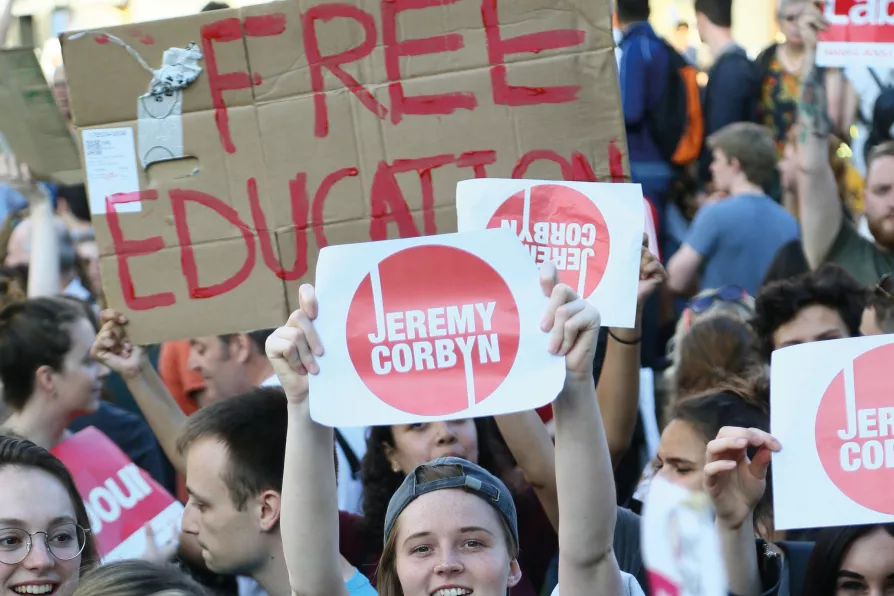Labour prospects in May elections may be irrevocably damaged by Birmingham Council’s costly refusal to settle the year-long dispute, warns STEVE WRIGHT

 YESTERDAY’S HOPE: Crowds outside the 2017 leaders debate
YESTERDAY’S HOPE: Crowds outside the 2017 leaders debate
THE LEFT, broadly conceived, has been the key organising force behind the 22 demonstrations in support of the Palestinians held in central London in 2024, most having hundreds of thousands marching. The Times columnist Patrick Maguire has speculated that 2025 might be the time that a new political force to the left of Labour appears.
Given the policy and performance failures of the government, albeit it remains early days, it’s hardly surprising, but easier said than done.
Indeed, since the demise of Chartism in the 1860s, there have been frequent attempts to organise the left politically. The Social Democratic Federation (SDF) in the 1880s and the Independent Labour Party (ILP) in the 1890s had some success, and both were represented at the founding of the Labour Party in 1900.
The SDF soon had second thoughts, while the ILP lasted until the 1930s before it broke away. From 1920, the Communist Party of Great Britain tried to link with Labour but was rebuffed later in the decade and remained an independent force on the left.
The 2000s have seen more attempts to organise the left in response to New Labour, Respect being perhaps the best known.
In the 2024 election, a loose grouping of independent candidates, including Jeremy Corbyn, focused on Palestine and austerity found some success. Elsewhere, the Greens also won some seats in Parliament and notably polled second to Labour across a swathe of north-east London seats.
In 1966, writing in the Socialist Register, Ralph Miliband surveyed the prospects for the left with a Labour government led by Harold Wilson in office. He found no sign of either socialist principles or policies and considered, as numbers of us are still doing almost 60 years on, what the left could do about it.
Miliband argued that an essential requirement for a new left formation was a “genuine demand” for it in the trade unions but went on to note that it must involve “socialists wherever in the Labour movement or outside they may be situated. Such an effort is not an alternative to an immediate involvement in concrete struggle but an essential element of it.”
This poses a further question of membership and support. The end of 2024 was marked by a squabble between the Tories and Reform UK Ltd about how many members they had. Leaving aside the reality that Reform is a business where Nigel Farage is the majority shareholder, the wider issue is that members are those who organise at the grassroots in communities and workplaces.
In 1953, the Tory Party had around 2.8 million members. It was a political and social organisation associated as much with dances and, in some places, gardening clubs as it was with Westminster politics. Yet that level of membership gave it a ready army of canvassers at election times. Labour membership in the same period was around a million.
In the digital age, it might be wondered if physical membership is a rather outdated thing. Morgan McSweeney, Labour’s electoral strategist, clearly thinks so. Labour won a landslide victory on July 4 2024, but it has become clear since that it was not a victory strongly rooted in constituency sentiment.
When Corbyn was Labour leader, the party had well over 500,000 members and got over 12 million votes in the 2017 election. The idiosyncrasies of Britain’s election system kept him out of 10 Downing Street, but a strong grassroots base for left politics remains.
The lessons of the ILP and others over a hundred years ago is that the road to electoral and political success and sustained support lies not in Westminster HQs but far away in workplace and community struggles in what EP Thompson 60 years ago dubbed those shadowy parts — the provinces.
Keith Flett is a socialist historian. Follow him on X @kmflett.

It’s not just the Starmer regime: the workers of Britain have always faced legal affronts on their right to assemble and dissent, and the Labour Party especially has meddled with our freedoms from its earliest days, writes KEITH FLETT

Who you ask and how you ask matter, as does why you are asking — the history of opinion polls shows they are as much about creating opinions as they are about recording them, writes socialist historian KEITH FLETT

Research shows Farage mainly gets rebel voters from the Tory base and Labour loses voters to the Greens and Lib Dems — but this doesn’t mean the danger from the right isn’t real, explains historian KEITH FLETT











